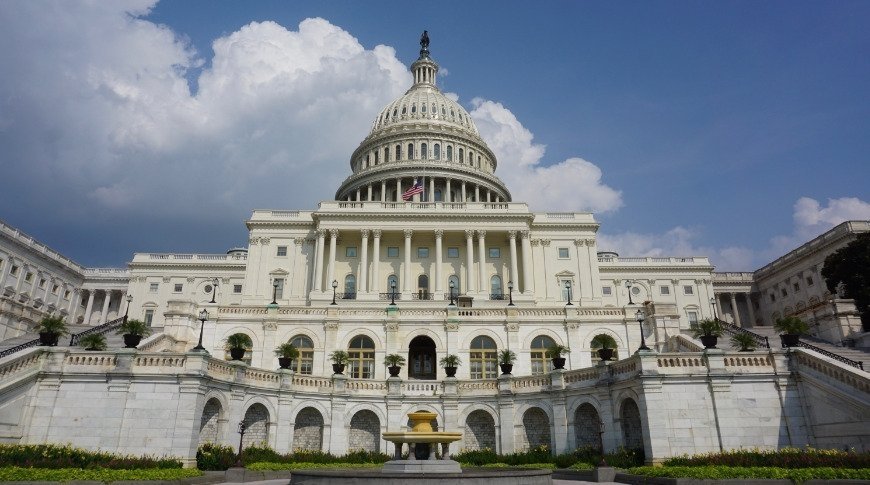Following a debate that extended into the early morning, the US House Judiciary Committee has advanced all but one of the bills before it that focus on curbing Big Tech and its ability to promote its own products and services over others — and the last one will likely get the nod on Thursday.
After a Wednesday approval of a bill to increase the antitrust enforcement budget, the committee has now also backed all but one of the bills concerning Big Tech market dominance. The bills have advanced despite lobbying efforts from Google and Apple, which included CEO Tim Cook reportedly phoning Speaker Nancy Pelosi directly.
Central to the package is the American Choice and Innovation Online Act, which is concerned with preventing dominant platforms from unfairly promoting their own services. According to the Wall Street Journal, it was approved by a vote of 24 to 20.
The Augmenting Compatibility and Competition by Enabling Service Switching, or Access, Act, was passed 25 to 19. This bill aims to give the FTC extensive new powers to set standards for the large tech companies.
Rep. Jim Jordan (R - OH), was among those objecting to extending the FTC's powers. He argued that gave unprecedented power and even the ability to impose a political agenda on the firms.
Broader concerns regarding all of the bills was reportedly also debated by both Democrats and Republicans. Reportedly, issues were raised over the fairness of targeting only the largest technology platforms.
At the same time, the Wall Street Journal says that lawmakers questioned whether Microsoft had successfully lobbied to be excluded from the proposed legislation. Rep. David Cicilline (D - RI) denied that any firm was exempted, and separately a Microsoft spokesperson claimed there had been no lobbying.
"At its core, this issue is fundamentally about whether or not we have an economy where businesses fighting for economic survival can actually succeed," said Cicilline. He claimed that the unchecked power of the largest technology firms was a threat to the economy, and even to American democracy.
"The president is encouraged by the bipartisan work to address problems created by big tech platforms," said a White House official. "We hope the legislative process continues to move forward on these bipartisan proposals, and we look forward to working with Congress to continue developing these ideas."
With the Committee expected to approve the entire package after it reconvenes at 11:00 AM on Thursday, the entire package will likely move forward to debate and a vote by the full House. It is not yet clear when that may take place, and the White House reportedly suggested that more work was needed on the legislation.
Apple has not responded to the outcome of the vote, though it did release a public document and an open letter to the committee ahead of it.
Google's vice president of government affairs and public policy, Mark Isakowitz, did tell the Wall Street Journal that Google wants more debate on the topics.
"American consumers and small businesses would be shocked at how these bills would break many of their favorite services," he said. "This would all dramatically undermine US technology leadership, damage the way small businesses connect with consumers and raise serious privacy and security concerns."
Keep up with everything Apple in the weekly AppleInsider Podcast — and get a fast news update from AppleInsider Daily. Just say, "Hey, Siri," to your HomePod mini and ask for these podcasts, and our latest HomeKit Insider episode too.
If you want an ad-free main AppleInsider Podcast experience, you can support the AppleInsider podcast by subscribing for $5 per month through Apple's Podcasts app, or via Patreon if you prefer any other podcast player.
 William Gallagher
William Gallagher

-m.jpg)






 Andrew O'Hara
Andrew O'Hara
 Wesley Hilliard
Wesley Hilliard

 Malcolm Owen
Malcolm Owen
 Marko Zivkovic
Marko Zivkovic

 Chip Loder
Chip Loder
 Christine McKee
Christine McKee




-m.jpg)




8 Comments
This issue could put Apple and Google on the same side for once.
"
There is nothing intrinsically bad in what he is describing.
Having 'favourite' services break could easily be deemed a logical cause of any efforts to loosen mega companies' grip on those services. Consumers may well find 'new' favourites. How many people remember Myspace?
It does not necessarily have to undermine US tech 'leadership' as other US companies could come to the fore. If he was speaking of US tech companies on the world stage, then many would actively welcome that and that itself is something which competition watchdogs around the globe might actually desire.
Before Google reached its current status, it did fine with Gmail and Drive and a very basic YouTube.
Having real competition overseen by legislation and watchdogs could be a very good thing if implemented correctly.
I don’t see much in these bills that would actually help consumers or address the behavior of Big Tech. Still massive ad tracking/data mining, selective censorship, and abuse of near-monopoly power with search results being manipulated for various business or ideological reasons. Apple is the least of the problem in my view. Google, Amazon, Twitter and Facebook are the major offenders. The first two basically own the internet. The others have all but monopolized the public square, and work with the first two big companies to stifle competition (e.g. alternative social media sites). It shouldn’t be a partisan issue. Tech companies having this much power and the ability to limit speech is bad for everyone. Just look at what happened with the lab leak “theory.” They quite literally may have endangered public health.